#howard hawks' his girl friday
Explore tagged Tumblr posts
Photo

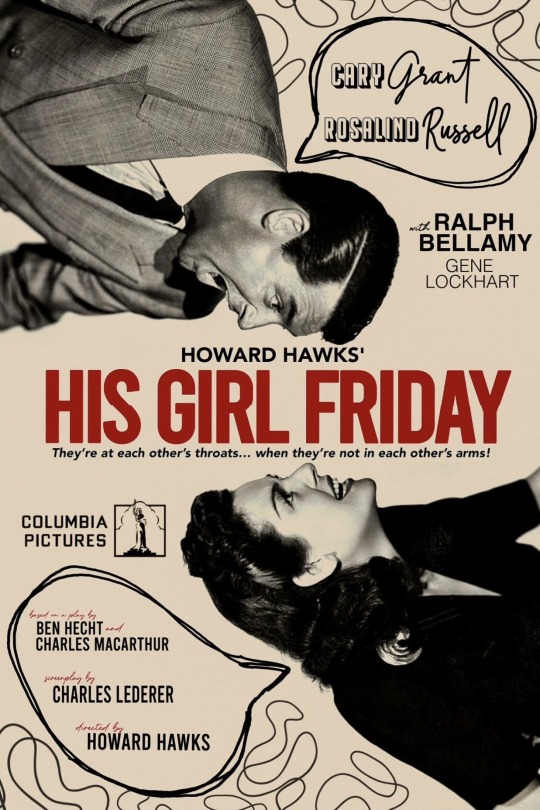



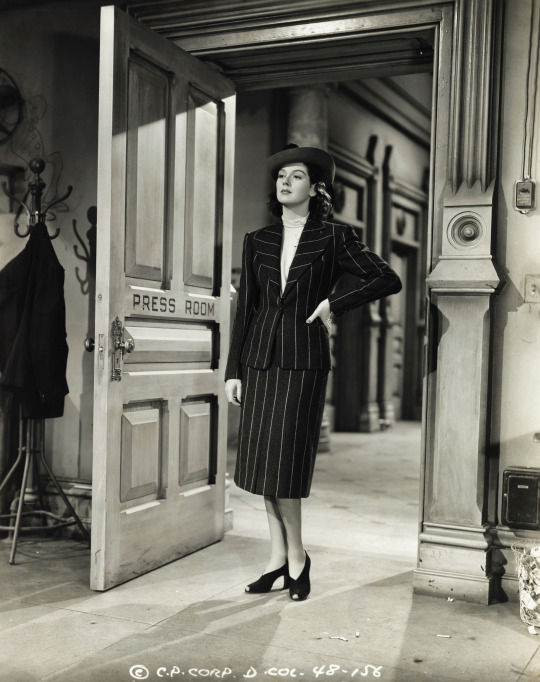
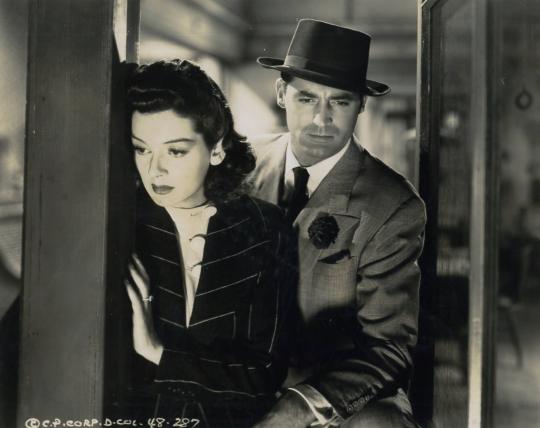
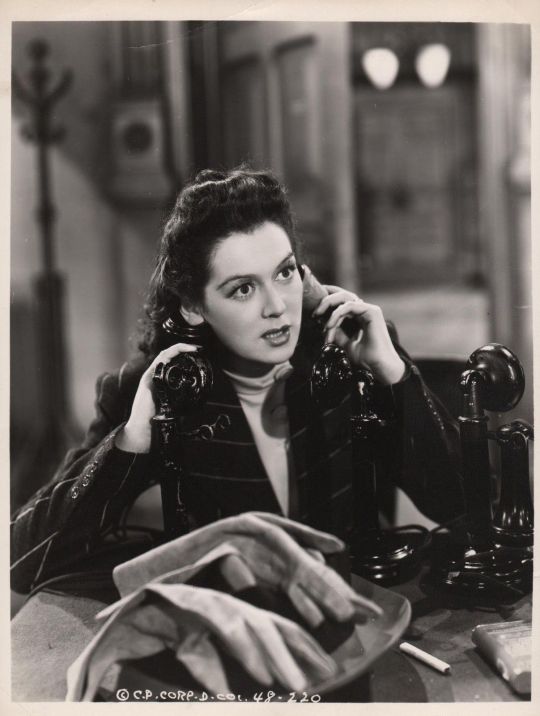
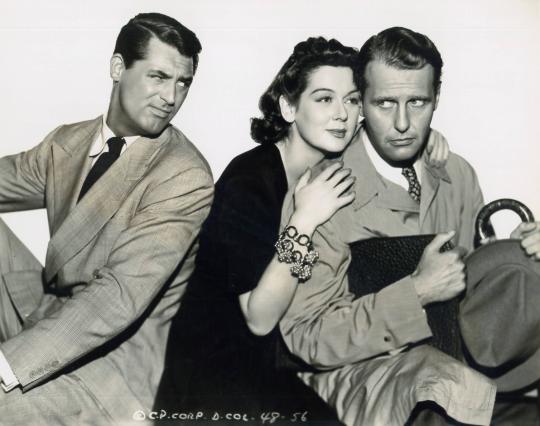

His Girl Friday (1940) Howard Hawks
January 24th 2023
#his girl friday#1940#howard hawks#rosalind russell#cary grant#ralph bellamy#gene lockhart#john qualen#frank orth#helen mack#abner biberman#porter hall#roscoe karns#clarence kolb#cliff edwards#frank jenks#regis toomey#billy gilbert#alma kruger#howard hawks' his girl friday#favourite
40 notes
·
View notes
Text
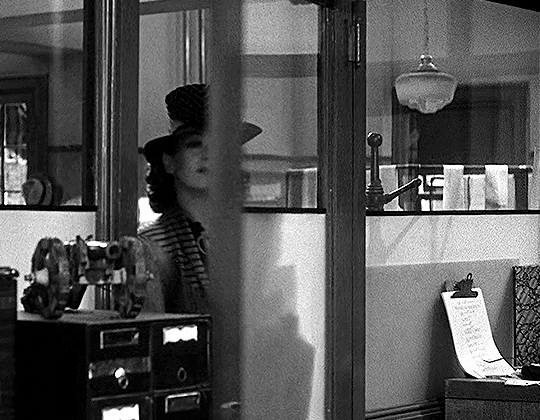
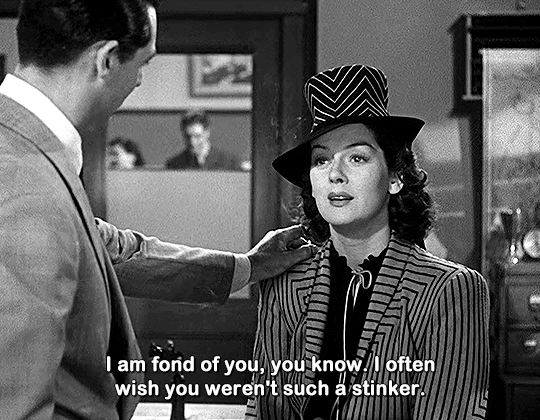
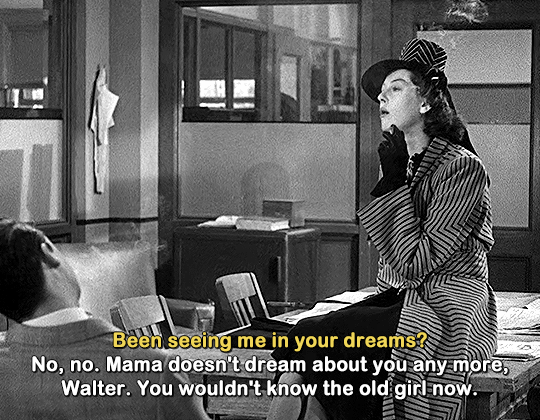
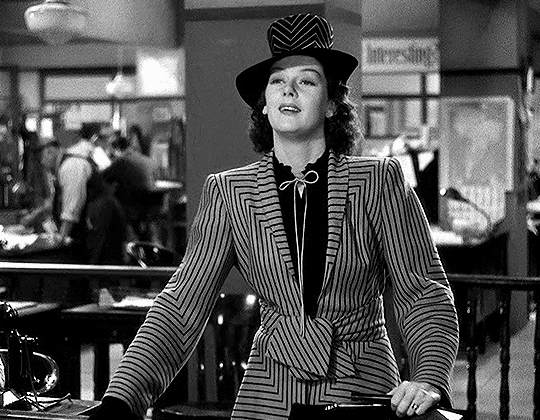
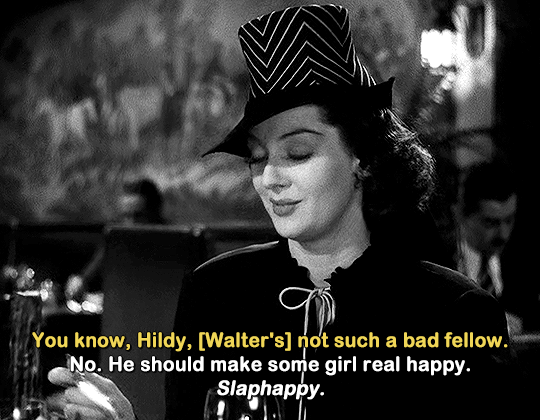
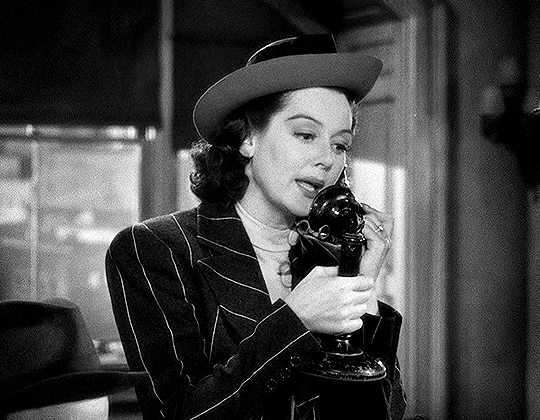
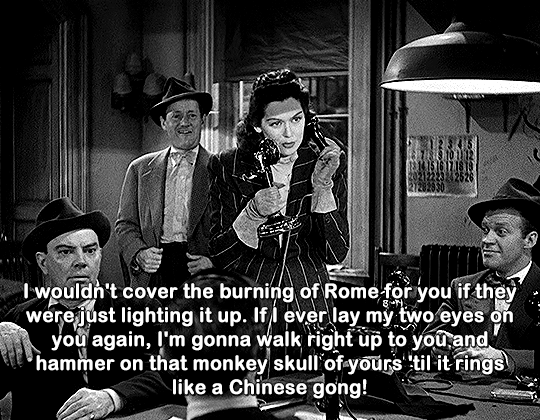
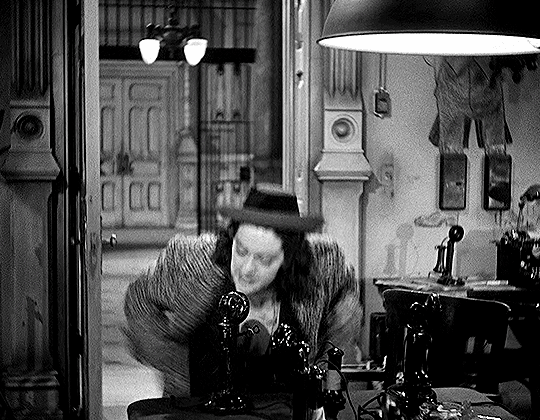
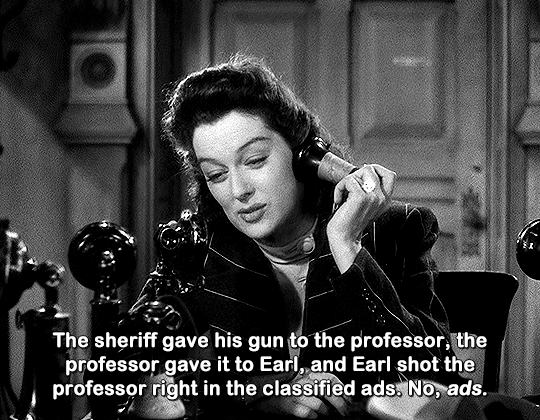
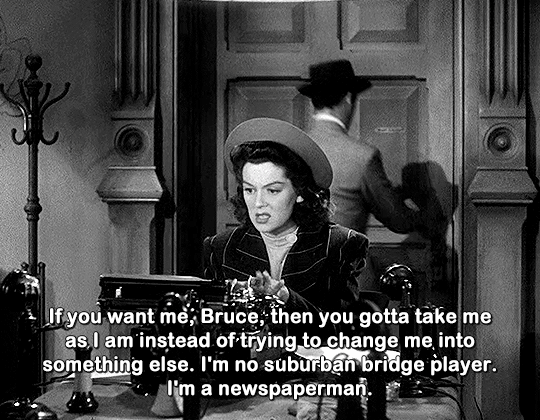
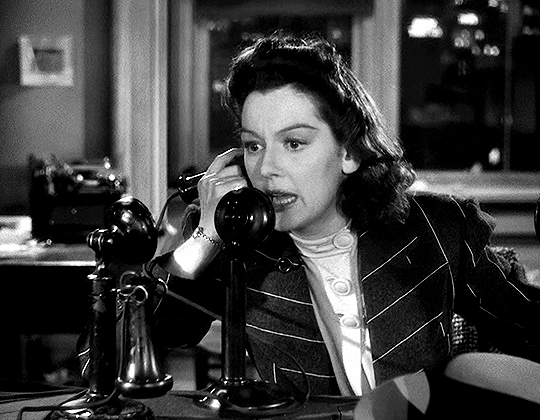
FAVORITE CLASSIC FILM PERFORMANCES
ROSALIND RUSSELL as Hildegarde "Hildy" Johnson in HIS GIRL FRIDAY (1940) dir. Howard Hawks
Next time you see me, I shall be riding in a Rolls Royce giving interviews on success. So long, you wage slaves. When you're crawling up fire escapes and getting kicked out of front doors and eating Christmas dinners in one-arm joints— don't forget your pal, Hildy Johnson!
#filmedit#filmgifs#filmblr#oldhollywoodedit#classicfilmedit#classicfilmblr#classicfilmsource#cinemaspast#usersjoy#uservita#userelissa#ritahayworrth#rosalind russell#his girl friday#howard hawks#1940#1940s#*fav#*mygifs#long post#it's crazy to me that rosalind was far down the list of choices for hildy bc roz IS hildy to me.#i can imagine other actresses in this role but i do not want to <3
1K notes
·
View notes
Text

His Girl Friday, 1940 (dir. Howard Hawks)
370 notes
·
View notes
Text


They broke the mold with this one.
Director Howard Hawks with Cary Grant and Rosalind Russell on set of HIS GIRL FRIDAY (1940).
34 notes
·
View notes
Text
His Girl Friday (1940)
#cary grant#his girl friday#1940#video#alma kruger#gene lockhart#frank jenks#roscoe karns#howard hawks#movie scenes#screwball comedy#1940s film#40s movies#b&w
49 notes
·
View notes
Text

Howard Hawks’ “His Girl Friday” January 18, 1940.
#Howard Hawks#His Girl Friday#1940#Forties#Comedy#Romantic Comedy#Crime Drama#Cary Grant#Rosalind Russell#3/5
8 notes
·
View notes
Photo

"His Girl Friday" (1940) Directed by Howard Hawks (Comedy/Drama/Romance)
59 notes
·
View notes
Text
Obligatory not so straight Cary Grant moment

Cary Grant and Rosalind Russell in His Girl Friday (1940)
#cary grant#rosalind russell#his girl friday#screwball comedy#howard hawks#black and white movies#Honestly iconic of him to have so many outright gay moments
47 notes
·
View notes
Text
ep. 143: Finale - His Girl Friday

For 8 years, you've led where we've followed, and we've loved every minute—well, almost every minute! Before we kick off our final discussion of a Gilmore Girls pop culture reference, we take a look back at our favorite references and guests, as well as a few that surprised us and few we're happy we won't ever need to revisit. Then we dig into His Girl Friday, the classic screwball romantic comedy that served as an inspiration for our favorite series. How many versions of the story have been made? How did its dialogue inspire Amy Sherman-Palladino? And most importantly...can Kyla finally name all of the Beatles?
More pop culture we ref: Broadcast News; Valley of the Dolls; Funny Girl; Grey Gardens; Gilligan's Island; That Girl; Xanadu; Swept Away; A Star Is Born; How to Lose a Guy in 10 Days; Bringing Up Baby; The Marvelous Mrs. Maisel; Electra Woman and Dyna Girl; Pippi Longstocking; Gaslight
LISTEN TO THE EP
Apple Podcasts
Spotify

MORE ABOUT HIS GIRL FRIDAY
TCM entry
"AFI's 100 Years…100 Laughs," AFI.com
"His Girl Friday: No. 13 Best Comedy Film of All Time," TheGuardian.com (2010)
"Why I Love … the First Scene of His Girl Friday," TheGuardian.com (2013)
"How His Girl Friday, One of the Best Movies of All Time, Led to Today’s TV Dramedies," Vulture.com (2017)
"His Girl Friday Redefined the Screwball Comedy at 240 Words per Minute," AVClub.com (2020)
"He Said, She Said, We Said, You Said," NYTimes.com (2020)
"How to Lose a Guy in 10 Days Revolutionized Rom-Coms — and Inspired a Wave of Female Journalists," IndieWire.com (2023)
"The 100 Best Movies of the Past 10 Decades: His Girl Friday (1940)," TIME.com (2023)
"Cary Grant Movies: 15 Greatest Films Ranked From Worst to Best," GoldDerby.com (2024)
"Twisters Director Took His Cues From Several Golden Age Filmmakers," SlashFilm.com (2024)
"His Girl Friday: THR’s 1939 Review," HollywoodReporter.com (2024)

MORE ABOUT GILMORE GIRLS + HIS GIRL FRIDAY
"Why Everyone on Gilmore Girls Talks a Mile a Minute," Vox.com (2016)
"Gilmore Girls: Sean Gunn Talks his Inspiration for Kirk," EW.com (2016)
"‘Nothing Like a Jew Eating a Pickle and You Put Some Christmas Carols Over It,’" Vulture.com (2017)
#His Girl Friday#Gilmore Girls#Amy Sherman-Palladino#stars Hollow#Alexis Bledel#Lauren Graham#Rory Gilmore#Lorelai Gilmore#Cary Grant#Rosalind Russell#Howard Hawks
2 notes
·
View notes
Photo










His Girl Friday (1940) dir. Howard Hawks
73 notes
·
View notes
Text



26 notes
·
View notes
Photo

23 notes
·
View notes
Text

#thanks for your submission!#movies#polls#his girl friday#cary grant#rosalind russell#howard hawks#ended#result: unseen
4 notes
·
View notes
Text
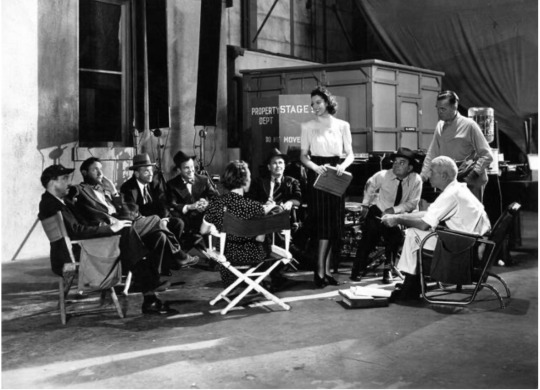
Rehearsing a scene for HIS GIRL FRIDAY (1940) at Columbia: Director Howard Hawks, Rosalind Russell, and the extraordinary supporting cast including Porter Hall, Roscoe Karns, Ernest Truex, Frank Jenks, and Regis Toomey.
31 notes
·
View notes
Text


1939 Zenith 6-S-304 radio, as seen in His Girl Friday (1940)
#identifying props#zenith#vintage radio#his girl friday#30s design#30s tech#vintage electronics#1940#movie props#set decoration#cary grant#abner biberman#howard hawks#40s movies#1940s film
33 notes
·
View notes
Text
Another new episode!
Script below the break.
Hello and welcome back to The Rewatch Rewind! My name is Jane, and this is the podcast where I count down my top 40 most frequently rewatched movies in a 20-year period. Today I will be talking about number 15 on my list: Columbia Pictures’ 1940 fast-talking comedy His Girl Friday, directed by Howard Hawks, written by Charles Lederer (and uncredited Ben Hecht and Morrie Ryskind), based on the play “The Front Page” by Ben Hecht and Charles MacArthur, and starring Cary Grant, Rosalind Russell, and Ralph Bellamy.
After a four-month absence, reporter Hildy Johnson (Rosalind Russell) returns to the office of The Morning Post to inform her ex-husband/boss, editor Walter Burns (Cary Grant), that she is about to marry insurance agent Bruce Baldwin (Ralph Bellamy), settle down, and quit the newspaper business for good. Desperate to win her back, both professionally and romantically, Walter entices Hildy to write one last great story for the paper, while doing everything he can to sabotage her relationship with Bruce.
I don’t remember any of my first impressions of this movie, or if I had seen it before I started keeping track. I assume it was one of the many old movies I got from the library relatively early in my foray into Old Hollywood, so I might have seen it in 2002. I definitely saw it once in 2003, once in 2005, once each in 2007 through 2009, three times in 2010, three times in 2012, once in each year from 2013 through 2016, twice in 2017, once in 2018, twice in 2019, and twice in 2022. I know that in 2010, I took a class at community college called “film as literature,” in which some assignments involved picking a movie and three different aspects of filmmaking, and discussing how those three aspects enhanced the story of that particular film. The instructor advised us to watch the movie we were writing about three times, focusing on a different aspect each time, and His Girl Friday was one of the movies I wrote a paper like that about (I focused on dialogue, props, and lighting), so that explains the three times in 2010. But I can’t think of a good explanation for why I watched it three times again in 2012, aside from the fact that it’s a great movie that I always enjoy watching. It’s also one that feels particularly appropriate to include in my annual Cary Grant birthday marathon, because it happened to come out on his birthday in 1940, so that’s part of why I watch it almost every year.
By far the best and most noteworthy aspect of this movie is its rapid-fire dialogue. Yes, a lot of old movies are very dialogue-heavy with people talking pretty fast, but like, His Girl Friday takes it to a whole other level. A typical movie averages around 90 words of dialogue per minute; His Girl Friday averages around 240. Many lines were specifically written so that the beginning and the end didn’t matter, allowing the actors to talk over each other, as people do in real conversations, without preventing the audience from understanding what was going on. All the fast, overlapping talking is particularly impressive given that multi-track recording hadn’t been developed yet, so they couldn’t adjust the volumes of different speakers separately in post-production; they just turned different overhead microphones on and off so the primary speaker was louder when they were recording, with some scenes reportedly requiring up to 35 switches – shout out to that sound department. At the time, the record for fastest film dialogue was held by the 1931 version of The Front Page, and director Howard Hawks was determined to break it with this adaptation, which he later proved he had done by screening the two versions next to each other. He also encouraged the actors to improvise, which made filming take longer – as it had with his earlier Bringing Up Baby – but helped the conversations feel even more authentic. Rosalind Russell felt that Cary Grant had more good lines in the script than she did, so she hired her own writer to help enhance her dialogue. Apparently at one point, after she did something unscripted, Grant broke character and said into camera, “Is she going to do that?” which Hawks really wanted to keep in the movie, but ultimately didn’t make the final cut. But several noteworthy ad-libs remained, including at least two, possibly three, amazing inside jokes. One is when Walter says, “He looks like that fellow in the movies…Ralph Bellamy” about Bruce, who did, in fact, look exactly like Ralph Bellamy, the actor playing him. And then there’s the part when the mayor says, “You’re through,” and Walter replies with, “The last man that said that to me was Archie Leach,” in reference to Cary Grant’s birth name – yes, he had the same birth surname as me, but we’re not related as far as I know. And the third, which has not been officially confirmed as an ad-lib or intentional reference but might have been, is when Walter calls the man hiding in a desk a “mock turtle,” which was the character Grant played in the 1933 Alice in Wonderland movie.
So basically, this film was made specifically for Cary Grant fans, and that’s a big part of why I love it. Walter Burns is one of his less likable characters – he’s selfish and deceptive and manipulative – but also one of his most fun to watch. Grant nails every beat of the breakneck-paced dialogue, knowing exactly when to pull focus toward himself and when to fade back to let his scene partner shine through. He still keeps going in the background, though, which helps make this movie especially rewatchable. As you can probably tell from the mere existence of this podcast, I enjoy rewatching movies anyway, but with His Girl Friday in particular, there are so many excellent moments that I didn’t notice until I’d seen the whole film many times, and I’m still noticing new things with every rewatch. While you don’t need to hear the overlapping bits of dialogue to follow the movie, once you’re familiar with the story it’s very fun to go back and listen for the parts you missed before. And several actors – Grant in particular – make some great reaction faces in the background that are worth watching out for. So if you’ve only seen this movie once, I would highly recommend revisiting it.
And it’s not just Cary Grant – Rosalind Russell is absolutely fabulous in this movie. Hildy Johnson was a man in The Front Page, but when Howard Hawks heard his female secretary reading the lines during auditions, he thought they sounded great coming from a woman and decided to turn Hildy into Walter’s ex-wife. It would have been nice if they could have changed one of the main characters into a woman without making her automatically romantically involved with the other main character, but we can’t have everything. Many actresses were considered but ended up either turning it down or being too expensive to hire. Russell knew she was not a top choice and was apparently very insecure about that, but she had no reason to be because she was perfect. All the reporters in the movie talk ridiculously fast, but she leaves them in the dust and makes it look easy. It took me many takes just to quote part of one of her many rapid monologues at the end of last episode without tripping over my words; I don’t know how she did it. And while she’s talking a mile a minute, she’s also portraying an incredibly layered and nuanced character. The wonderful character actors playing the other reporters do a great job of conveying that they have embraced the cold, detached mindset of caring more about the scoop than the story itself. Hildy shares this to a certain extent, but she hasn’t completely lost her sense of empathy the way they have. She fits in with the guys, but she’s also better than them, both as a journalist and as a human being, without seeming too perfect to be realistic, which is an incredibly complex and difficult balance to strike, but again, Rosalind Russell nails it. Much as I love Grant’s performance, Russell is really the glue that holds the whole thing together, and she commits to that role completely.
Hildy is such a strong character that I’m always disappointed when she goes back to Walter at the end. She is clearly a much better match with him than with Bruce, whose slow, deliberate speech contrasts rather jarringly with Hildy and Walter’s snappy patter. But Walter has learned exactly zero lessons by the end of the movie, and there is no reason to believe that any of the problems with their first marriage will ever be resolved. Throughout the movie, Hildy is torn between wanting the domestic life of Bruce’s wife and the more hectic life of a newspaper reporter that still has a hold on her. When Walter tells her she can’t quit because she’s a newspaperman, she replies that that’s why she’s leaving, so she can be a woman. But as much as she complains about it, she makes it pretty clear that she does love being a reporter. I think there is a part of her that genuinely likes the idea of settling down as a housewife, but it seems like the main reason she wants to do that is because society is telling her that’s what women are supposed to do. So I’m very glad the movie doesn’t make her marry Bruce. I also recognize that at the time it was rather radical to suggest that a woman should pursue a career in something other than homemaking if she wants to, let alone suggest that she doesn’t have to completely give up the idea of having a husband to do so. In 1940 it was highly unusual to show a man wanting his wife to also have a career like Walter does. So from that perspective it is kind of nice to see them get back together. But at the same time, he treats her pretty terribly, and it kind of feels like it’s saying that a career gal should be happy with any man she can manage to get, regardless of how slimy he is. Not that Hildy doesn’t also treat Walter pretty terribly too. I guess they show their affection by hurling insults at each other, which is a type of relationship that makes no sense to me, but they seem to be on the same page about it. Still, I would love to see Hildy walk out on both Walter and Bruce like the strong, independent woman she is. At least the movie makes it clear that, despite its title, she is nobody’s assistant, or “girl Friday.”
The progressive for 1940 but doesn’t quite work now theme extends beyond feminism. Besides the Walter/Hildy/Bruce love triangle, the other main storyline in the movie involves a man named Earl Williams, played by John Qualen, who is about to be hanged for killing a policeman, despite some legitimate questions regarding his sanity. Walter wants Hildy to do one final interview with Earl to show that he definitely wasn’t responsible for his actions, and that he’s being strategically executed a few days before an election so the incumbent sheriff and mayor will look tough on crime and win. Most of the reporters don’t seem to care, asking the sheriff if he can move the execution up a few hours so it can make their morning editions. The sheriff refuses, but it is very clear that he could not care less about upholding the law, and same with the mayor, because when a messenger from the governor arrives with a reprieve, they try to bribe him to leave and come back later so they can still execute Williams and pretend the reprieve arrived too late. And it’s not just the politicians who are corrupt. Hildy bribes a prison guard twice: first to get an interview with Earl Williams, and then to find out how he managed to get a gun and escape. Then when Hildy and Walter find Williams, they hide him, not because they think he’s innocent and want to save him, but because they want to be able to turn him in after they’ve written the story of how they captured him. The movie’s statements about the way American society treats working-class people on the fringes, like Earl, and the way the criminal justice system is easily manipulated for political or financial gain, are honestly still pretty accurate, for the most part. But in a bizarre twist, Walter tells Bruce and Hildy that the policeman Earl shot was black, and that the politicians are trying to get votes from black people by executing his white killer, which is just, so completely backwards from how anything actually works that it kind of detracts from the legitimate points the movie does make. Everything about this story just screams late 1930s/early 1940s, from the characters’ world views to the costumes to the current event references, which makes sense given when the movie was made, but is completely inconsistent with the written prologue at the beginning, which states: “It all happened in the dark ages of the newspaper game – when to a reporter getting that story justified anything short of murder. Incidentally, you will see in this picture no resemblance to the men and women of the press today. Ready? Well, once upon a time—” It’s like, nice try, but in 1940 you can’t pretend this is set in a bygone era and then talk about Hitler and the European war. I don’t think they were really fooling anyone, but at least this allowed the filmmakers to get away with criticizing journalists without getting sued or censored.
Speaking of being censored, one of the few female characters in this movie, Mollie Malloy (played by Helen Mack), kind of seems like she’s supposed to be a prostitute, but of course they weren’t allowed to say that so it’s not super clear. What we do know is that she befriended Earl Williams shortly before he was arrested and has visited him in jail, and that the press has been inaccurately representing the nature of Earl and Mollie’s relationship. I don’t know if it was partly because of the Hays Code that they specifically state that Earl and Mollie haven’t slept together, but regardless of the reason, I’m always a fan of platonic male/female friendship. And the way the movie shows that they care about each other deeply in a non-sexual way, while portraying the reporters as wrong for sexualizing their relationship, feels almost like it’s saying “asexual rights” and we love to see it. We don’t really know what’s going to happen to Earl and Mollie after the events of the film, but I hope that Earl gets the mental health care he needs – he won’t because it’s 1940 but we can pretend – and that Mollie fully recovers from jumping out of the window – we know she’s alive but not how badly she’s hurt – and that they remain close friends.
While this movie touches on a lot of dark themes, overall the tone is lighthearted. It feels like it’s exposing the world for the hellscape that it is and laughing at it. And while some of its attitudes feel very outdated and problematic, that mood is still relatable. His Girl Friday is hectic and chaotic and screwball, but it manages to remain at least somewhat grounded and real. So watching it can feel like either escaping from the real world or looking into a mirror held up to the real world, depending on what the viewer chooses to focus on. This makes it an appropriate movie to watch in many different moods, which helps explain why I revisit it so often. That and the incredible fast-talking performances that I’m still in awe of. And, of course, Cary Grant’s presence always helps.
Thank you for listening to me discuss another of my most frequently rewatched movies. Next up is the fourth and longest movie I watched 22 times in 20 years, which is also from the 1940s, so stay tuned for another oldie. It is also probably the most disturbing movie on this list, just to warn anyone who may be watching along. As always, I will leave you with a quote from that next movie: “Are you suggesting that this is a knife I hold in my hand?”
9 notes
·
View notes